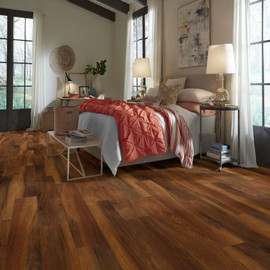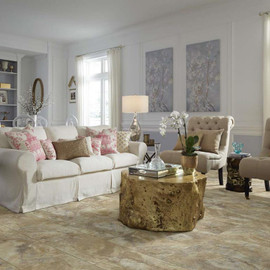How To Select Hardwood Flooring
Posted by Ben Garelick (@BlueShirtBenny) on 11th Mar 2025
Are you thinking about redesigning a space in your house? At Carpet & Tile Mart, we understand that selecting the right flooring is a significant decision that can enhance the beauty and functionality of your home. As a leading provider of flooring solutions, we pride ourselves on our commitment to customer satisfaction.
With a massive inventory, we can connect you to exactly what you're looking for. Once you find your perfect flooring, we can install it as soon as you need it, thanks to our close relationships with trusted local contractors. Our team installs within a 50-mile radius of our locations.
Understanding Your Needs
Before diving into the specifics of our hardwood flooring types and styles, take a moment to evaluate your unique needs and preferences. We recommend considering the following:
- Room size/layout: The size and layout of your room can influence the type of hardwood you choose. Larger spaces benefit from wider planks, while narrower boards complement smaller rooms.
- Purpose of room: Consider how the room will be used. High-traffic areas, like hallways and living rooms, require more durable options to withstand wear and tear.
- Lifestyle: If you have children or pets, you’ll want to select hardwood that is resistant to scratches and dents. Some species are more durable than others, making them better suited for active households.
- Maintenance: Different finishes and wood species require varying levels of maintenance. Understanding how much time you’re willing to invest in upkeep is crucial.
- Budget: Hardwood flooring can vary significantly in price. Set a budget before you begin shopping to help narrow down your options.
Types of Hardwood
When considering how to choose hardwood flooring, start by understanding the two main categories — solid and engineered. Solid hardwood is made from a single piece of wood, while engineered hardwood has multiple layers. At Carpet & Tile Mart, we offer both solid and engineered hardwood flooring in multiple species of wood.
Domestic Hardwood Species
The best hardwood floors often come from common domestic species, including:
- Oak: Oak is a favorite among homeowners due to its durability and classic look. It comes in both red and white varieties, each offering unique grain patterns and colors.
- Maple: Maple is harder than oak. It provides a sleek, contemporary aesthetic and is often used in high-traffic areas.
- Cherry: With its rich color and smooth texture, cherry adds warmth to any space but may be more prone to scratches.
If longevity is important to you when choosing wood floors, knowing the Janka hardness rating can help. This scale measures the wood’s resistance to wear. Higher ratings indicate more durability, making them ideal for high-traffic areas. For example, oak typically rates around 1,390, while harder options like hickory can reach 1,820 or more — making it the hardest domestic species.
Engineered Domestic Hardwood Species
Engineered domestic hardwood has the appearance of solid hardwood thanks to its veneer but has a plywood core. This type of hardwood is super durable, making it a popular choice for households. It's also often easier and cheaper to install than solid hardwood. So, if you are looking for the best DIY option, you might want to consider click-together engineered hardwood options.
However, there are some disadvantages to choosing an engineered domestic hardwood. Because the attractive part of the plank is a veneer, you can often sand it down and refinish it. If the flooring has thin veneers, the life span of your floors will drastically decrease.
Exotic Hardwood Species
Some people may be interested in exotic hardwood species because of their aesthetics and durability. Aesthetically, exotic hardwood species are highly sought after because of their vivid color contrasts and interesting grain patterns. If you're after a stylish and contemporary look, you'll probably prefer exotic species over traditional domestic hardwood.
Exotic species are also more durable than domestic wood. This advantage makes this type of flooring perfect for high-traffic areas. It's also great for long-term durability, as it's more scratch-resistant and stronger than other types of hardwood.
Here are two exotic wood species:
- Mahogany: Mahogany features a deep, rich color and striking grain. It can add a touch of luxury to your home.
- Teak: Teak is water-resistant and very durable. It's often used in humid environments and has a beautiful golden hue.
Exotic woods are worth the investment, they offer unique characteristics that can set your home apart.
Engineered Exotic Hardwood Species
If you love the look of exotic hardwood species but want to save some money, opting for our engineered exotic hardwood floors will help you stay within budget. Since engineered wood uses less expensive wood, it often costs less than solid hardwood planks.
However, just like other types of engineered hardwood, this type of flooring is still prone to moisture and sun damage. It also requires just as much maintenance as solid hardwood flooring. So, if you are looking for flooring that requires little to no maintenance, then you're better off with a different type of flooring, like laminate.
Bamboo Flooring
As one of the most popular hardwood flooring types available on the market, our bamboo wood flooring has an excellent reputation for durability and budget-friendly prices. However, Bamboo is not actually wood. It's a type of grass commonly found in Asia. It's important to note that because bamboo is grass, it's more affected by moisture than other hardwood options.
Stranded bamboo flooring is one of the most durable options, as the stalks are shredded and then heated together to form planks. Like laminate flooring options, stranded bamboo flooring comes in many different color options that mimic the look of other hardwood flooring types, like cherry or oak.
However, stranded bamboo doesn't have a natural appearance so it tends to resemble laminate flooring instead of actual hardwood. If you want a look that's more authentic, then horizontal bamboo flooring is the closest option, though it's less durable than stranded bamboo flooring. With this option, you'll see the grains and nodes on the planks.
Style and Appearance
When it comes to the aesthetics of hardwood flooring, consider the following:
- Plank thickness: You can sand and refinish thicker planks, typically 3/4 inch for solid hardwood, more times than thinner options. This helps to extend their life span.
- Engineered thickness: Engineered hardwood typically ranges from 3/8 to 1/2 inch thick, which can influence durability and installation options.
- Smooth vs. hand-scraped: Smooth finishes offer a modern look. Hand-scraped textures add more character and charm.
- Grain patterns: When choosing wood, consider the grain pattern — straight, wavy or mixed — as it can impact the overall visual interest of your floors.
- Stains: You can choose from a wide variety of stains to match your decor. Lighter stains can make a room feel larger, while darker stains add warmth.
- Finishing options: Various finishes — oil-based, water-based, matte, satin or gloss — can dramatically change the look and feel of your flooring.
Choose Hardwood from Carpet & Tile Mart
Hardwood flooring is a great investment for your home and adds a sophisticated design element to any space. While you consider the different types of hardwood available, you'll need to keep in mind your lifestyle, budget and style preferences. Though you may love the appearance of exotic hardwood species, the price may not fit your budget.
If you're looking to stay in your preferred price range but still want the luxury of solid hardwood flooring, then choosing a domestic hardwood floor is a great option. We have all different types of solid and engineered hardwood flooring available at different price points so you'll be able to choose the flooring that's right for your space. Ready to find your ideal flooring? Visit a store near you to touch, feel and experience the floors before making a purchase, or shop online today. We stand behind all our products and recommendations.





